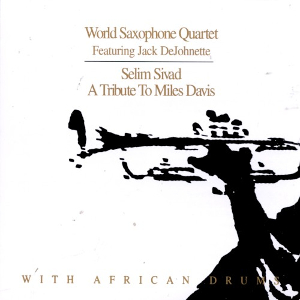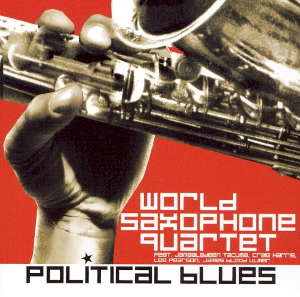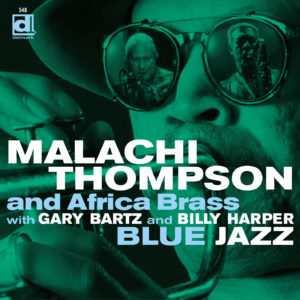
Oliver Lake is an American jazz saxophonist, flutist, composer, poet, and visual artist. He is known mainly for alto saxophone but he also performs on soprano and flute. During the 1960s Lake worked with the Black Artists Group in St. Louis. In 1977 he founded the World Saxophone Quartet with David Murray, Julius Hemphill, and Hamiet Bluiett. He has worked in the group Trio 3 with Reggie Workman and Andrew Cyrille. He has appeared on more than 80 albums as a bandleader, co-leader, and side musician. He is the father of drummer Gene Lake. Lake has been a resident of Montclair, New Jersey.

Hamiet Bluiett was an American jazz saxophonist, clarinetist, and composer. His primary instrument was the baritone saxophone, and he was considered one of the finest players of this instrument. A member of the World Saxophone Quartet, he also played the bass saxophone, E-flat alto clarinet, E-flat contra-alto clarinet, and wooden flute.
Fred Hopkins was a double bassist who played a major role in the development of the avant-garde jazz movement. He was best known for his association with the trio Air with Henry Threadgill and Steve McCall, and for his numerous performances and extensive recordings with major jazz musicians such as Muhal Richard Abrams, Arthur Blythe, Oliver Lake, and David Murray. He was a member of the AACM, and a frequent participant in the loft jazz scene of the 1970s. He also co-led a number of albums with the composer and cellist Diedre Murray. Gary Giddins wrote that Hopkins' playing "fused audacious power with mercuric reflexes." Howard Reich, writing in the Chicago Tribune, stated that "many connoisseurs considered [Hopkins] the most accomplished jazz bassist of his generation" and praised him for "the extraordinarily fluid technique, sumptuous tone and innovative methods he brought to his instrument."
Malachi Richard Thompson, was an American avant-garde jazz trumpet player. In addition to his own work as a bandleader, Thompson was known for his work in the brass ensemble led by fellow trumpeter Lester Bowie.

Moving Right Along is an album by the jazz group the World Saxophone Quartet released in 1993 on the Italian Black Saint label.

Selim Sivad: The Music of Miles Davis is an album by the jazz group the World Saxophone Quartet released on the Canadian Justin Time label. The album features performances by Hamiet Bluiett, John Purcell, Oliver Lake and David Murray, with guests Jack DeJohnette, Chief Bey, Okyerema Asante, and Titos Sompa and is dedicated to Miles Davis.

Political Blues is an album by the jazz group the World Saxophone Quartet released by the Canadian Justin Time label. The album features performances by Hamiet Bluiett, Jaleel Shaw, Oliver Lake and David Murray, with guests Craig Harris on trombone, Jeremy Pelt on trumpet, James "Blood" Ulmer on guitar, Jamaaladeen Tacuma on bass guitar, and Lee Pearson on drums.

Fanfare for the Warriors is a 1973 album by the Art Ensemble of Chicago first released on the Atlantic label. It features performances by Lester Bowie, Joseph Jarman, Roscoe Mitchell, Malachi Favors Maghostut and Don Moye along with AACM leader Muhal Richard Abrams.

Delmark Records is the oldest American jazz and blues independent record label. It was founded in 1958 and is based in Chicago, Illinois. The label originated in St. Louis, Missouri, in 1953 when owner Bob Koester released a recording of the Windy City Six, a traditional jazz group, under the Delmar imprint.
Harrison Bankhead is an American jazz double-bassist.

Humility in the Light of the Creator is the debut album by the American jazz saxophonist Maurice McIntyre recorded in 1969 and released by the Delmark label.

Spirit is an album by the American jazz trumpeter Malachi Thompson recorded and released by the Delmark label in 1983.

The Jaz Life is an album by the American jazz trumpeter Malachi Thompson recorded in 1991 and released by the Delmark label the following year.

Lift Every Voice is an album by the American jazz trumpeter Malachi Thompson recorded and released by the Delmark label in 1983.

New Standards is an album by the American jazz trumpeter Malachi Thompson recorded and released by the Delmark label in 1993.

Buddy Bolden's Rag is an album by the American jazz trumpeter Malachi Thompson recorded and released by the Delmark label in 1995.

47th Street is an album by the American jazz trumpeter Malachi Thompson released by the Delmark label in 1998. The album formed part of Thompson's efforts to revitalize the Sutherland Hotel one of the last remaining links to the 47th Street Jazz Scene in Chicago.

Freebop Now! is an album by the American jazz trumpeter Malachi Thompson recorded and released by the Delmark label in 1998.

Rising Daystar is an album by the American jazz trumpeter Malachi Thompson released by the Delmark label in 1999.

Blue Jazz is the final studio album by the American jazz trumpeter Malachi Thompson released by the Delmark label in 2003.

















